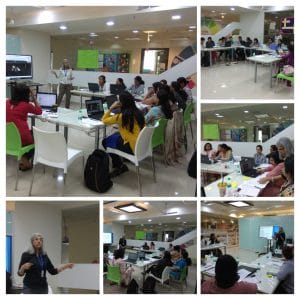This week I had an opportunity to meet with a group of librarians through MISA – Members of International Schools. We, Librarians, talked about the importance of Information and Media Literacy and how important it is for us to think analytically and critically about the information and media that we consume every day. Right from waking up in the morning, we are drawn to our mobiles for the WhatsApp messages, our Facebook or Instagram updates. Soon, after that, we turn our TV sets for our regular spiritual gyans, news or simply our private channels that we subscribe to. Our children are silent or active consumers of our morning routine. Each one of us, children and adults are then off to work or school and are continually bombarded with advertisements on buses, billboards, and trains, basically, our media-saturated world. Before we are misguided or misinformed, we must learn to understand, analyze, evaluate media and information, so that we are able to make informed choices. According to Center for Media Literacy, we need to be asking 5 questions: Who created the media? What creative techniques have been used to create media? How might different people view this message, differently from me? Why is this message sent? What lifestyles, values, and points of view are represented in; or omitted in this message?
Asking these questions helps us navigate the busy media world in a safe way, Asking questions can help us make informed decisions about money, health, government, and work. We need to think about our beliefs, what is important to us and how we can make informed decisions that will help our family, friends, and humanity at large. Having diverse perspectives and multiple perspectives can help broaden our beliefs. What we must be careful of not being skewed in our thoughts, ideas, and beliefs. This happens when we begin to only view, read, and move to a direction of what we want to learn or continue to believe it. When we do this, we must consciously try and seek different perspectives so that we have a better understanding of a topic. Take for example” Raj adopted a Vegan Diet and his life changed for him. He was suffering from a Migraine, now, he has few headaches. He insists his family move toward a vegan diet for good health. He shares his experiences, his knowledge, and correct information about a vegan diet to all. Should I adopt a vegan diet, should I not analyze my lifestyle, my belief, and knowledge of other diets to help me make an informed decision that suits my physical and mental state of the body. Thus, learning to get a variety of perspectives from information and media can help me make informed choices.
